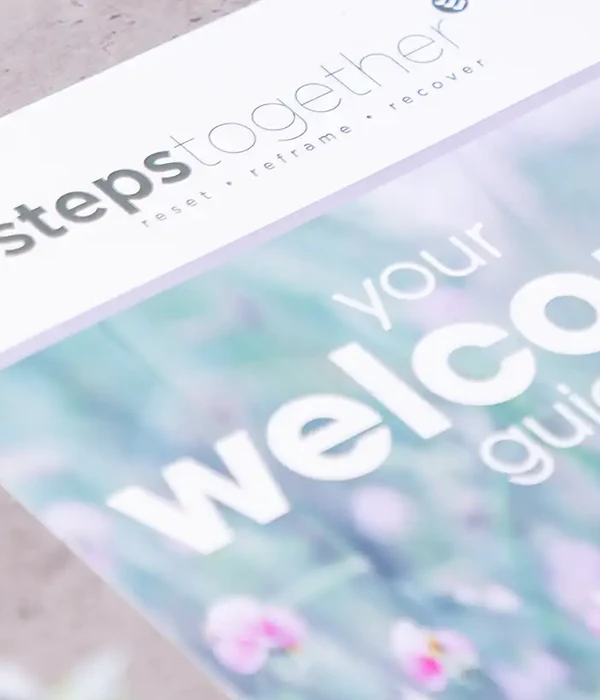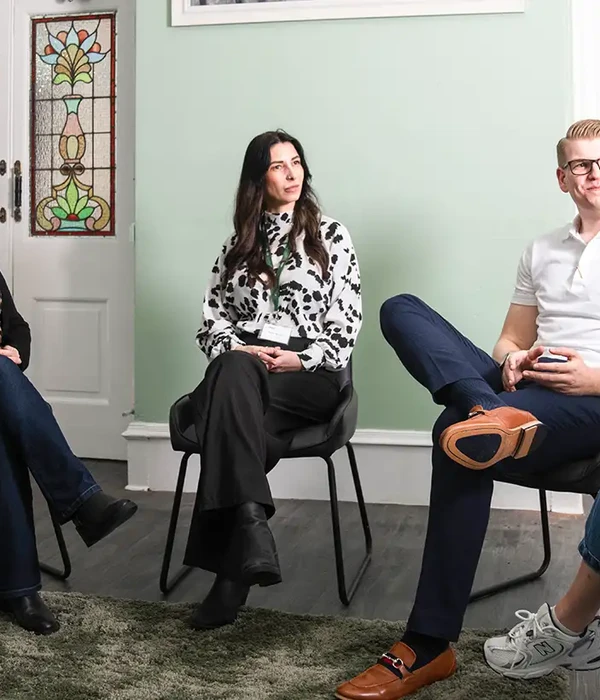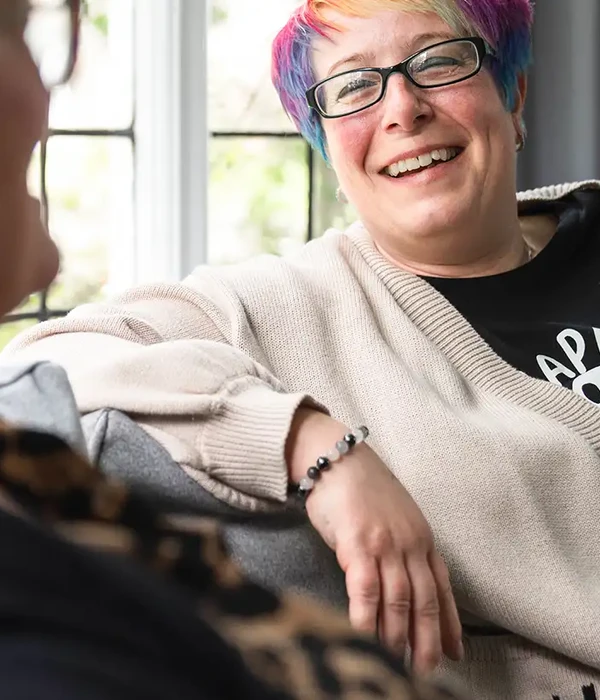Synthetic Drug Addiction Treatment
Synthetic drug use is a problem that can affect anyone. These substances are man-made and designed to alter how your brain and body function. When you develop an addiction to synthetic drugs, it can be difficult to stop on your own.
You may face serious physical and mental health risks if you continue using these illicit drugs. A synthetic drug addiction treatment programme is designed to support you every step of the way and can make a big difference for those affected by substance abuse.

Take the First Step Towards Recovery
Steps Together offers personalised support and proven treatments, providing the care, guidance and encouragement you need to move forward with confidence and build a healthier future.

Understanding Synthetic Drug Addiction
Synthetic drugs are man-made substances created in laboratories. Unlike natural drugs such as marijuana or cocaine, these substances are engineered to imitate or boost similar effects using chemicals. Because they imitate normal drugs, synthetic drug use can also lead to addiction.
Synthetic drugs often pose unique challenges because their ingredients can change quickly, making them hard to regulate. Being addicted to synthetic drugs can have dangerous mental and physical effects, often more unpredictable than natural ones. They may also worsen underlying mental health conditions, and in some cases create what is known as a dual diagnosis, where both addiction and mental health issues must be treated together.
Prevalence and Availability
Many synthetic drugs are widely available in many areas. You might see them for sale in shops under innocent names, or online with misleading labels. Their easy access and low cost make them especially popular among young people and those looking for alternatives to traditional drugs.
These substances have become a growing public health concern because new versions appear faster than laws can control them. The constant changes in ingredients make it hard for health services and lawmakers to keep up, which complicates addiction treatment and prevention.


Risks and Effects of Synthetic Drugs
Taking synthetic drugs can lead to serious health problems. Because ingredients are often unknown or untested, effects may be more intense or dangerous than natural drugs. Even one use can cause overdose, euphoria, psychosis, hallucinations, and paranoia.
Common health risks include high blood pressure, heart problems, respiratory depression, and severe mood swings. Mental health issues often follow, such as anxiety, panic attacks, and depression.
Synthetic Drug Addiction Treatment
Treating synthetic drug addiction often involves several kinds of therapy. These support you during detox, help to prevent relapse, and address mental health needs. Synthetic drug addiction treatment options include:
Drug Detox
Synthetic drug detox is often the first step in recovery from drug abuse and addiction. This process helps remove harmful substances from your body under medical supervision. Some detox programmes offer 24-hour medical help to manage withdrawal symptoms, which can range from anxiety and agitation to headaches or nausea.
If you use more than one substance or have a mental health disorder, detox can be more complex. Medical staff may use medication-assisted treatment (MAT) such as methadone to help with cravings and relieve symptoms.
Family Therapy and Support Systems
Family therapy aims to repair relationships strained by addiction. These sessions involve family members, allowing you to discuss concerns and learn new ways to communicate effectively.
This approach helps your whole family understand the challenges of addiction and recovery. Support systems are important for relapse prevention. Family members, peers, or friends can offer emotional support, encouragement, and accountability.
Cognitive-Behavioural Therapy (CBT)
Cognitive-behavioural therapy (CBT) is a mainstay in addiction treatment. In CBT sessions, you work closely with a therapist to recognise negative thoughts and behaviour patterns tied to drug use.
CBT gives you practical tools to cope with triggers, manage stress, and prevent relapse. You learn to replace unhelpful thoughts with healthier ones. Many people with addiction also have other mental health challenges, like depression or anxiety; CBT can help with these, too.
Inpatient and Outpatient Rehab
Rehab programmes are either inpatient, where you stay at a treatment centre, or outpatient, where you live at home and attend sessions regularly. Both offer structured synthetic drug addiction treatment, evidence-based therapies, and relapse prevention strategies.
Residential treatment provides personalised treatment with 24-hour supervision and access to doctors and peer support. It’s often recommended for severe addiction or if you have co-occurring mental health conditions. outpatient treatment suits those with milder addictions or strong support systems at home.
Most Common Synthetic Drugs treated in our addiction rehabilitation centres

Signs and Symptoms of Synthetic Drug Use
Identifying synthetic drug addiction early on is crucial, as these substances can rapidly impact your physical health, mental stability, and relationships. Early signs may include mood swings, paranoia, changes in appearance, or risky behaviours. Recognising these warning signs allows for timely intervention.
Professionals use assessments, evaluations, and interviews to understand the severity of your drug use and any co-occurring conditions. Early identification and support increase your odds of successful treatment and recovery.
Recognising Symptoms of Synthetic Drug Abuse
To diagnose synthetic drug addiction, medical professionals use a detailed screening and assessment process. They start with questions about your recent substance use, mental health, and personal history. This helps them find out if synthetic drug use has led to a substance use disorder.
Synthetic drug addiction can look different from other forms of drug abuse, but there are key signs to watch for. You may have strong cravings or feel compelled to use the substance even when you try to stop. Irritability and sudden mood swings often appear, and it’s common to deal with anxiety or depression.

Types of Synthetic Drugs
These are made to mimic cannabis but often lead to much stronger effects. Synthetic cannabis can cause a fast heart rate, high blood pressure, and confusion. They are sometimes referred to as spice or K2.
These drugs act like stimulants. Synthetic stimulants can lead to agitation, paranoia, or even dangerous heart and mental health issues. Some of the common examples of these drugs include bath salts and flakka.
These synthetic drugs are designed to mimic prescription painkillers but carry a high risk of overdose and severe respiratory depression. Fentanyl is one of the most well-known examples, and it is extremely potent and dangerous, even in small doses, especially when used illicitly.
Aftercare and Long-Term Recovery Support
Ongoing recovery from synthetic drug addiction often depends on aftercare, structured support, and healthy habits. Access to community resources, support groups, and practical strategies helps you stay focused and avoid relapse.
Aftercare for Synthetic Drug Addiction
Aftercare is a long-term plan made to keep you on track after the initial phase of addiction treatment. It provides a safety net once formal therapy concludes. Many aftercare programmes offer a mix of counselling, relapse planning, and regular check-ins with professionals.
You might access group therapy or support groups tailored for synthetic drug addiction. These help you share experiences, build healthy routines, and stay accountable. Aftercare also teaches you to spot warning signs of relapse and builds your confidence in the recovery process.
Holistic Approaches and Mindfulness
Holistic treatment approaches help you recover on both a mental and physical level. These methods often incorporate mindfulness, meditation, exercise, and a balanced diet. Practising mindfulness can teach you to notice cravings or difficult emotions without reacting to them straight away.
Many people find that activities like yoga or deep breathing improve emotional support and resilience. These habits help you stay present and make thoughtful choices, even during stressful times. Some aftercare programmes also connect you with workshops or classes on meditation, relaxation, and wellness.
Relapse Prevention and Community Resources
Relapse prevention is crucial to achieving and maintaining long-term recovery. You learn how to deal with triggers, stress, and cravings using practical techniques and ongoing support. Identifying personal triggers helps you prepare for challenging moments when cravings may be strongest.
Peer support is available in many forms, like recovery groups or alumni programmes. These connections keep you engaged and provide reliable help during setbacks. Access to community resources, such as local drop-in centres, helplines, or structured routines, also reinforces your commitment to sobriety.

We Offer a Variety of Treatment Options
Synthetic drug addiction treatment is essential for anyone struggling with dependence on these powerful substances. At our treatment centre, we offer a range of comprehensive support options tailored to individual needs. This includes residential treatment, where clients receive 24-hour care in a safe, structured environment.
Our experienced team provides medical support, therapy, and personalised care plans to address both the physical and psychological aspects of addiction. At Steps Together, we’re here to help you or a loved one take a journey toward lasting recovery.
Frequently Asked Questions
What are the most effective therapies for overcoming addiction to designer substances?
Cognitive behavioural therapy is often used to treat designer drug addiction. These therapies help you identify and change harmful patterns of thought and behaviour linked to drug use. As part of structured behavioural health treatment, different therapy modalities can be combined to provide a personalised approach. Medical treatments such as medication-assisted therapy (MAT) may also help with withdrawal and cravings, depending on your needs.
What role does counselling play in the rehabilitation from artificial drug dependency?
Counselling gives you practical tools to manage triggers and avoid relapse. It also helps you work through the emotional reasons that may have led you to use synthetic drugs. Both individual and group counselling are available, offering a safe space to share and learn healthy coping skills.
What support systems are in place for families of those battling synthetic substance abuse?
Families can access support groups, educational workshops, and professional counselling. These resources help families understand addiction and learn ways to support loved ones in recovery. Many treatment centres also offer family programmes that provide guidance and help families rebuild trust.
What is the detoxification process for synthetic narcotics?
During detox, your body clears the synthetic drugs from your system. Medical supervision is important as withdrawal symptoms can be intense, and you may need medication for support. The length and specific steps of detox will depend on which synthetic drug you used and how long you have been using it.
How long is the typical treatment duration for individuals addicted to novel psychoactive compounds?
The treatment duration for novel psychoactive compounds varies from person to person but typically lasts from a few weeks to several months. Some individuals may require ongoing support after formal treatment concludes. Factors like the type of substance, your overall health, and progress in therapy can affect how long you may need structured care.
Are there any legal implications for undergoing treatment for addiction to non-traditional drugs?
There are no legal penalties for seeking treatment for addiction to synthetic or non-traditional drugs. Medical confidentiality laws protect your treatment records. However, possessing, using, or distributing illegal designer drugs may have legal consequences.





